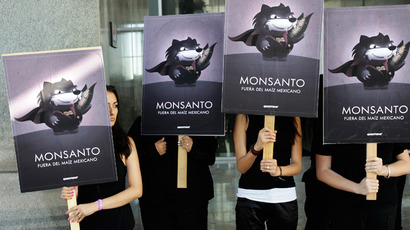Tea Party lashes out at ‘Monsanto Protection Act’

Members of the Tea Party have joined protesters standing up against the ‘Monsanto Protection Act’, calling the provision a ‘special interest loophole’ for friends of Congress.
The provision has now sparked so much outrage that both the far right and the far left are uniting in their condemnation of Section 735 of the Agricultural Appropriations Bill, which President Barack Obama signed into law last week.
This section, which critics refer to as the ‘Monsanto Protection Act’, safeguards the biotech company from any sort of litigation. Buried within the 78-page bill, the provision allows agriculture companies to plant and sell genetically modified seeds and genetically modified organisms, without facing the risk of litigation.
The passage of the provision has led to nationwide protests and a Food Democracy Now petition that at least 250,000 people have signed in opposition to the provision. Members of the Tea Party Patriots have also taken a stance against the ‘Monsanto Protection Act’, which was first revealed through a blog post published by the party on its website. Dustin Siggins, a blogger for the Tea Party, narrowed down the political group’s perspective, which may differ in terms of environmental beliefs but which remains consistent in its opposition to the legal bypasses that the provision grants biotech companies like Monsanto.
Siggins claims that “environmentalists are dishonest in calling this the Monsanto Protection Act, [since] it is a provision in the CR that protects a number of businesses and industries,” but that regardless of what the provision is called, it still gives industries the ability to ignore court injunctions.
“This is a dangerous precedent,” Siggins writes. Although Tea Partiers might support the GMO industry and disagree with environmental activities on other issues, it is the interference with the court system that bothers the group.
"It is not the purview of Tea Party Patriots to comment on the merits of GMOs -– that is a discussion and debate for experts and activists within that field," Siggins adds. "From the perspective of citizens who want open, transparent government that serves the people, however, the so-called 'Monsanto Protection Act,' Section 735 of the Continuing Resolution, is one heck of a special interest loophole for friends of Congress."
Americans from a range of political backgrounds have voiced their concern over the ‘Monsanto Protection Act’ even before it was signed into law, but the president approved HR 933 despite the firestorm generated by the provision. Further explaining the ‘Tea Party perspective’, Siggins writes that even though the Tea Party tolerates certain loopholes and competitive benefits given to large corporations, this is one that can’t be overlooked.
“This all can be boiled down into a single, common phrase: a special interest loophole, and a doozy at that,” he writes. “We are used to subsidies, which give your tax dollars to companies to give them advantages over competitors. We are used to special interest tax loopholes and tax credits, which provide competitive and financial benefits to those with friends in Congress. And we are familiar with regulatory burden increases, which often prevent smaller companies from competing against larger ones because of the cost of compliance.”
But the ‘Monsonto Protection Act’ goes too far, thereby bringing the far-right in line with other protesters who are calling for the repeal of the provision.
“This is a different kind of special interest giveaway altogether,” he writes. “This is a situation in which a company is given the ability to ignore court orders, in what boils down to a deregulation scheme for a particular set of industries.”














